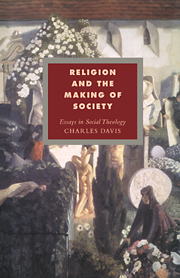Book contents
- Frontmatter
- Contents
- General editors' preface
- Acknowledgements
- Introduction: from the secular to the supernatural
- PART I Society, religion and human agency
- PART II Praxis, narrative and religious language
- 5 Theology and praxis
- 6 Revelation, historical continuity and the rationality of tradition
- 7 The political use and misuse of religious language
- PART III From the modern subject to the postmodern self
- PART IV The option for the future
- Index
- Cambridge Studies In Ideology And Religion
7 - The political use and misuse of religious language
Published online by Cambridge University Press: 18 December 2009
- Frontmatter
- Contents
- General editors' preface
- Acknowledgements
- Introduction: from the secular to the supernatural
- PART I Society, religion and human agency
- PART II Praxis, narrative and religious language
- 5 Theology and praxis
- 6 Revelation, historical continuity and the rationality of tradition
- 7 The political use and misuse of religious language
- PART III From the modern subject to the postmodern self
- PART IV The option for the future
- Index
- Cambridge Studies In Ideology And Religion
Summary
Spending a sabbatical leave in Israel, I could not avoid being confronted with the claim of some religious Israelis that God had given them the Holy Land in perpetuity. They had, so they argued, a God-given right that justified them in dismissing the claims of any others, notably the Palestinians, who had come to occupy Eretz Yisrael in the course of history. Any merely human right, founded in international law, had to yield to the divine right of the Jews, founded in God's covenant and promise. ‘God gave us this land’ – a sentence that would seem to come spontaneously to the lips of even some secular Israelis when challenged, say, about Israel's policy over the West Bank and Gaza. As Menachem Begin said: ‘Nobody has the right to tell me whether I can stay in Judea and Samaria, since this right is given to me by God the Father of Abraham, Isaac and Jacob’.
The Jewish claim to the Holy Land on the basis of God's gift is accepted by some Christians as well as by the Jews themselves. It would be difficult to find a stronger statement than that of Jacques Maritain in the Post-Scriptum (1964) to his Le Mystère d'Israel et autres essais. There he insisted that it is absolutely, divinely certain that Israel has the incontestable right to the Land of Canaan. The people of Israel, he asserted, is the only people in the world to whom a land, the Land of Canaan, was given by the one transcendent God, creator of the universe and of the human race, and what God has given is given forever.
- Type
- Chapter
- Information
- Religion and the Making of SocietyEssays in Social Theology, pp. 112 - 128Publisher: Cambridge University PressPrint publication year: 1993



